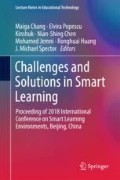Abstract
The Quantified Self is a movement for collecting personal data with the goal of providing possibilities for new insights through reflecting on own relevant data, with applications in areas such as physical exercise, food, and health. When collecting personal data, difficulties may arise, such as information from different sources which cannot easily be combined, closed access to information sources, inflexible tooling for producing desired quantifications, varying precision of data used for producing quantifications, and a lack of control over data sharing for supporting relevant comparisons with others. In this paper, we introduce the concept of smart interactions, backed by linked data, as a means of introducing the QS through smart and personal learning environments, both for reducing the associated difficulties and further empowering the QS.
Access this chapter
Tax calculation will be finalised at checkout
Purchases are for personal use only
Preview
Unable to display preview. Download preview PDF.
References
Swan, M.: The quantified self: Fundamental disruption in big data science and biological discovery. Big Data 1.2, 85–99 (2013)
Rivera-Pelayo, V., Zacharias, V., Müller, L., Braun, S.: Applying quantified self approaches to support reflective learning. In: Proceedings of the 2nd international conference on learning analytics and knowledge (pp. 111–114). ACM (2012)
Koper, R.: Conditions for effective smart learning environments. Smart Learning Environments 2014 1:5. SpringerOpen (2014)
Wilson, S.: Patterns of personal learning environments. Interactive learning environments. 2008 Apr 1, 16(1), 17–34 (2008)
Prost, S., Mattheiss, E., & Tscheligi, M.: From Awareness to Empowerment: Using Design Fiction to Explore Paths Towards a Sustainable Energy Future. In: Proceedings of the 18th ACM Conference on Computer Supported Cooperative Work & Social Computing (pp. 1649–1658). New York, NY, USA. ACM (2015)
Heath, T., Bizer, C.: Linked data: Evolving the web into a global data space. Synthesis lectures on the semantic web: theory and technology, 1(1), 1–136 (2011)
Vázquez, M.M., Rodríguez, M.C., Nistal, M.L.: Development of a xAPI application profile for self-regulated learning requirements for capturing SRL related data. Global Engineering Education Conference (EDUCON). IEEE (2015)
Bakharia, A., Kitto, K., Pardo, A., Gašević, D., & Dawson, S.: Recipe for success: lessons learnt from using xAPI within the connected learning analytics toolkit. In: Proceedings of the sixth international conference on learning analytics & knowledge (pp. 378–382). (2016)
Snell, J.M., Prodromou, E.: Activity Streams 2.0. W3C Recommendation, https://www.w3.org/TR/2017/REC-activitystreams-core-20170523/ (2017)
Isaksson, E., Naeve, A., Lefrère, P., & Wild, F.: Towards a Reference Architecture for Smart and Personal Learning Environments. In: Innovations in Smart Learning (pp. 79–88). Springer Singapore (2017)
Google: Gadgets Specification, https://developers.google.com/gadgets/docs/spec (2008)
Wiberg, M: Implicit interaction design. ACM Interactions blog, http://interactions.acm.org/blog/view/implicit-interaction-design (2014)
Sporny, M., et al.: JSON-LD 1.0: A JSON-based Serialization for Linked Data. W3C Recommendation, https://json-ld.org/spec/REC/json-ld/20140116/ (2014)
Lifesum, https://lifesum.com/
MyFitnessPal, https://www.myfitnesspal.com/
Hedin, B.: LCAFDB - A Crowdsourced Life Cycle Assessment Database for Food. In: 5th IFIP Conference on Sustainable Internet and ICT for Sustainability, Funchal, Portugal, 2017 December 6–7 (2017)
Acknowledgements
The research presented in this contribution has been partially carried out with financial support from the Swedish Energy Agency and the ECfunded projects ROLE (grant agr. 231396) and TELL ME (grant agr. 318329).
Author information
Authors and Affiliations
Corresponding author
Editor information
Editors and Affiliations
Rights and permissions
Copyright information
© 2018 Springer Nature Singapore Pte Ltd.
About this paper
Cite this paper
Isaksson, E., Hedin, B. (2018). Smart Interactions for the Quantified Self. In: Chang, M., et al. Challenges and Solutions in Smart Learning. Lecture Notes in Educational Technology. Springer, Singapore. https://doi.org/10.1007/978-981-10-8743-1_10
Download citation
DOI: https://doi.org/10.1007/978-981-10-8743-1_10
Published:
Publisher Name: Springer, Singapore
Print ISBN: 978-981-10-8742-4
Online ISBN: 978-981-10-8743-1
eBook Packages: EducationEducation (R0)

